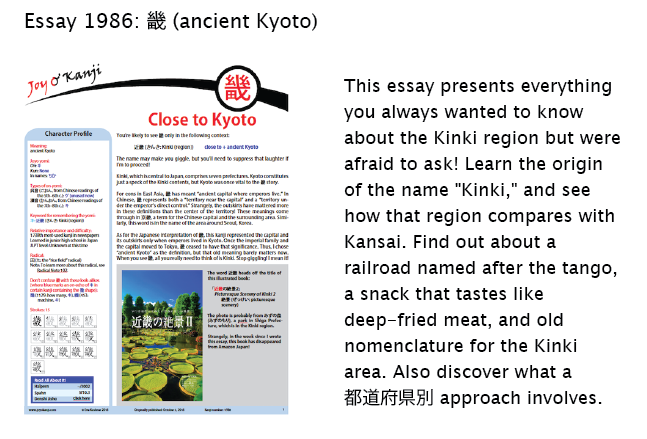Fish Tales
I recently came across a Japanese book on AI, and because I know that Jonathan Kirk of Kanshudo has a deep passion for the subject, I sent him the Amazon Japan link. He wrote back with great excitement about an idiom in the first comment and helpfully provided information about it from his site:
ç›®مپ‹م‚‰م‚¦مƒم‚³مپŒèگ½مپ،م‚‹
to see the light; be awakened to the truth; have the scales fall from one's eyes
ç›® (م‚پ: eye); èگ½مپ،م‚‹ (مپٹمپ،م‚‹: to fall)
I was puzzled by the م‚¦مƒم‚³, and when I looked into it further, I found that it corresponded to the non-Joyo é±—, which means "(fish) scale" in this context. Oh! I've heard "the scales fall from one's eyes" but never imagined a connection to fish! As I then discovered, the English saying comes from the Bible story in which something like fish scales fall from a man's eyes, enabling him to see again. The idiom probably entered Japanese when someone translated the Bible into that language.
What perfect timing to encounter this fishy idiom now, when I've just come across a fun German saying on a Web page that provides this explanation:
The idiom: Tomaten auf den Augen haben.
Literal translation: “You have tomatoes on your eyes.”
What it means: “You are not seeing what everyone else can see.”
Would you rather have a tomato or a fish scale obscuring your vision? Not an easy choice!
Another coincidence involves the closure of Tsukiji, the famous fish market in Tokyo. As I read a well-illustrated article about it, my eye repeatedly flitted away from images of dead fish and went instead to the numerous kanji signs. I don't have the rights to the photos in that article, so I'll just tell you about the kanji that intrigued me.
The first term, و°´ç”£, seemed to be saying that fish are manufactured (産) in water (و°´)! Yes, they are! But the compound has this meaning:
و°´ç”£ (مپ™مپ„مپ•م‚“: aquatic products; fisheries)
And in this case, the و°´ç”£ is part of a fish store name.
A yellow sign on the ceiling has this puzzler:
ن¸ٹ部é…چç®،هچ±é™؛
Beware of Exposed Pipes on Ceiling
ن¸ٹ部 (مپکم‚‡مپ†مپ¶: upper part); é…چç®،
(مپ¯مپ„مپ‹م‚“: pipes); هچ±é™؛ (مپچمپ‘م‚“: danger)
The ن¸ٹ部 means “upper part,” which contextually means “overhead" or "on the ceiling." The sign is probably telling people not to collide with the pipes, as some hang low.
Then there's this:
éڑم‚’ه¤§هˆ‡مپ«مپ—مپ¾مپ—م‚‡مپ†
Let's treasure fish
éڑ (مپ•مپ‹مپھ: fish); ه¤§هˆ‡مپ«مپ™م‚‹ (مپںمپ„مپ›مپ¤مپ«مپ™م‚‹:
to treasure, set a high value on)
Are they talking about monetary value? The value of fish in people's hearts and minds? According to my proofreader, the slogan is too general for us to know but generally says, "Let’s not waste fish."
The next part of that sign is as follows:
ه¤§ç‰©و¥ن¼ڑ
Omono Gyokai (an association of tuna brokers)
ه¤§ç‰© (مپٹمپٹم‚‚مپ®: big fish); و¥ن¼ڑ (مپژم‚‡مپ†مپ‹مپ„: business organization)
هچ¸ن؛”社 (مپٹم‚چمپ—مپ”مپ—م‚ƒ: five distributors who belong to ه¤§ç‰©و¥ç•Œ)
In the first line, the و¥ن¼ڑ is most likely a play on و¥ç•Œ (مپژم‚‡مپ†مپ‹مپ„: business world; industry).
As for the هچ¸ن؛”社, I nearly mixed up هچ¸ with the honorific prefix ه¾،-, but they're quite different in meaning. The prefix conveys respect, as in ه¾،é،” (مپٹمپ‹مپٹ: your honorable face), to pick a random example. By contrast, هچ¸ means "wholesale"!
I spotted the next bit written faintly in vertical kanji, so the biggest challenge was making out the strokes clearly enough to decipher this:
謹賀و–°ه¹´ (مپچم‚“مپŒمپ—م‚“مپم‚“: Happy New Year)
The other obstacle was not expecting to see that message hanging in Tsukiji!
Then there was a sign with an enormous tuna and flamboyantly large writing:
و¥µن¸ٹ (مپ”مپڈمپکم‚‡مپ†: first rate, best quality)
وœ¬مپ¾مپگم‚چ (مپ»م‚“مپ¾مپگم‚چ: authentic tuna)
築هœ°مپ™مپ—ن¸€ç•ھ (مپ¤مپچمپکمپ™مپ—مپ„مپ،مپ°م‚“: lit. "best sushi in Tsukiji," the name of a sushi restaurant chain)
24و™‚é–“ه–¶و¥ (24مپکمپ‹م‚“مپˆمپ„مپژم‚‡مپ†: open 24 hours a day)
The very last bit is مپ™مپگمƒ¨م‚³, where مƒ¨م‚³ corresponds to و¨ھ (side). As مپ™مپگ means "immediately" or "directly," مپ™مپگمƒ¨م‚³ probably means “The restaurant or entrance or parking lot is just next to this sign."
I also found a huge sign saying ه¤§é›… (مپ مپ„مپŒ). Breen defines that word (with the yomi مپںمپ„مپŒ) as a song, but that makes no sense here. Instead, the Tsukiji version of ه¤§é›… is the name of a fish store specializing in tuna. When you go to that store's website, you'll see ... enormous dead fish. Does that image whet people's appetites?
Another fish store name starts with a kanji that I found very hard to identify:
ç¯ ن¸€ (مپ—مپ®مپ„مپ،: name of a fish store)
The first kanji is non-Joyo and means "bamboo grass."
Then we come to a sign written in cheerful and very clear kanji:
وµ·é®®ن¸¼ (مپ‹مپ„مپ›م‚“مپ©م‚“مپ¶م‚ٹ: rice bowl topped with seafood)
è™ژو– (مپ„مپںمپ©م‚ٹ: Japanese knotweed)
The è™ژو– here is part of the name è™ژو–مƒمƒ¼م‚±مƒƒمƒˆ (Itadori Market), so the plant definition doesn't apply. Nor does it matter that the name contains a tiger (è™ژ)! That kanji precedes the non-Joyo و– (cane, walking stick).
The last characters that caught my attention were almost impossible to read, as they were in seal script on the back of a man's green happi (و³•è¢«, مپ¯مپ£مپ´) coat. You can see the kanji in the logo at the top of one website. They correspond to ç¥ç”°ه›ƒهگ (مپ‹م‚“مپ مپ°م‚„مپ—) in the script we all know and love. The non-Joyo ه›ƒ can mean "to beat time," "to jeer," or "to applaud"! That's quite a range! Be careful how you use that kanji!
I hope you applaud, rather than jeer, when you read the new essay. Here's a sneak preview:
Catch you back here next time!
â–â–â–
Did you like this post? Express your love by supporting Joy o' Kanji on Patreon:



Comments